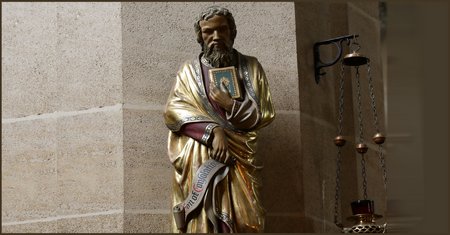The question is an interesting one, as Luke uses the Greek term apostolos in Acts 14:4,14 to describe both Paul and Barnabas. “But when the apostles Barnabas and Paul heard this, they tore their clothes and ran in among the multitude, crying out” (14:14).
However, it must be noted that the Greek term is a general term, defined by Thayer: “a delegate, messenger, one sent forth with orders.” As a general term, it is necessary to go to the context of any passage to determine the way in which the term is used.
For example, there is a specific way the word apostle is used to establish the office of apostle in Ephesians 4:11, “And He Himself gave some to be apostles, some prophets, some evangelists, and some pastors and teachers.” In this sense, there is a distinction between the office held by some, and the description given to Barnabas in Acts 14.
First, note that there were twelve original men given the office of apostle in the ministry of Jesus Christ. “And when He had called His twelve disciples to Him, He gave them power over unclean spirits, to cast them out, and to heal all kinds of sickness and all kinds of disease. Now the names of the twelve apostles are these: first, Simon, who is called Peter, and Andrew his brother; James the son of Zebedee, and John his brother; Philip and Bartholomew; Thomas and Matthew the tax collector; James the son of Alphaeus, and Lebbaeus, whose surname was Thaddaeus; Simon the Cananite, and Judas Iscariot, who also betrayed Him” (Matthew 10:1-4).
These twelve men remained a specific group, charged by Jesus with special duties, and given a commission to go and preach the coming kingdom to the Jews (10:5-ff). This continued until Judas Iscariot betrayed Jesus and committed suicide.
The eleven remaining apostles met together, and cast lots to allow the Lord to choose a man to take the place of Judas in their company. He chose Matthias, a man who had been with them from the beginning, and would too “become a witness with us of His resurrection” (Acts 1:19).
Finally, Paul was “chosen” by the Lord to be such an ambassador to “Gentiles, kings, and the children of Israel” (Acts 9:15). Paul constantly affirmed that his apostleship was a calling given directly from the Lord (1 Corinthians 1;1; Galatians 1:1, etc.) He did acknowledge he was “not worthy to be called an apostle” (1 Corinthians 15:9), and that he was “one born out of due time” (15:8). But he said, “by the grace of God I am what I am” (15:10).
So, only a total of fourteen men were given the special office of apostle. The original twelve, Matthias and then finally Paul.
The reference to Barnabas in Acts 14:4,14, was a reference to the special ministry to which he and Paul were appointed in Antioch, as recorded in Acts 13:2-3, “As they ministered to the Lord and fasted, the Holy Spirit said, ‘Now separate to Me Barnabas and Saul for the work to which I have called them.’ Then, having fasted and prayed, and laid hands on them, they sent them away.” Remember, the term apostolos refers to “one sent forth with orders.”
In fact, the same term is used in reference to Epaphroditus, who was a “messenger” of the Philippians church in sending support to Paul (Philippians 2:25). The word is translated differently, but is the Greek apostolos in that passage. Paul uses the term, again translated “messenger” to refer to his fellow workers in 2 Corinthians 8:23).
So, Barnabas was an apostolos, but not an Apostle.





